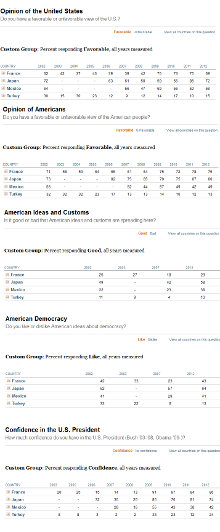Half of Mexicans have unfavorable image of Americans
The Pew Research Global Attitudes Project shows that Mexicans - the largest immigrant group to the U.S. - don't like Americans all that much.
Asked if they had a favorable view of the United States, just 56% of Mexicans said yes. Countries with higher percentages were Italy (74%), Japan (72%), France (69%), Poland (69%), Brazil (61%), Britain (60%), and Spain (58%).
Asked if they had a favorable view of the American people, just 49% of Mexicans said yes. Countries with higher percentages were Japan (80%), France (75%), Poland (73%), Britain (72%), Italy (71%), Germany (63%), Russia (63%), Lebanon (61%), Spain (60%), Brazil (59%), and the Czech Republic (56%).
While it's good that the French aren't blaming all of us for "cheese eating surrender monkeys" and "Freedom Fries", it's worrisome that so many people are coming here from countries with low opinions of Americans. Countries with high immigration to the U.S. but low opinions of the U.S. include Mexico, China (43%) and India (42%). Countries with low opinions of the American people include Mexico, India (42%), and China (39%).
But, none of them are as bad as Turkey, which consistently has the lowest opinion of Americans and American things. For instance, just 13% in Turkey have a favorable opinion of Americans.
Granted, those coming here might have a higher opinion of Americans than those who remain at home, there might be regional factors at play, a particular person might sharply disagree with his countrymen, and so on.
However, if you were just playing the numbers and wanted to choose immigrants who'd work out best for the U.S., would you concentrate on Turkey, or on France? Would you concentrate on Mexico, or Japan?
You can view the data yourself - including a few more questions that were asked - at pewglobal.org/database/?indicator=1. Click the image below to compare France, Japan, Mexico, and Turkey on four questions over several years. Note also the mostly negative response to George W Bush, followed by what appears to be initial support for Barack Obama, followed by what appears to be disillusionment over Obama not acting as they had expected.



